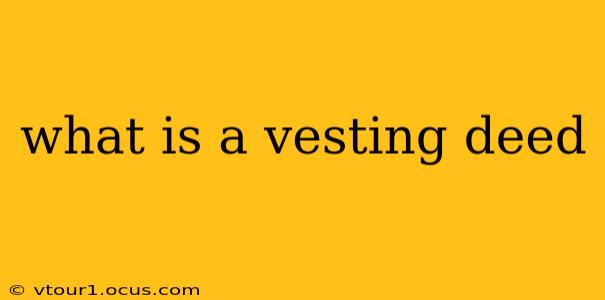A vesting deed is a legal document that establishes ownership of a property. Unlike other deeds that might transfer ownership from one party to another, a vesting deed primarily defines who owns the property and how that ownership is structured. This is crucial because it clarifies the rights and responsibilities of each owner, particularly important in situations involving multiple owners. Understanding vesting deeds is vital for property owners, especially those involved in joint ownership, inheritance, or business partnerships.
What Information Does a Vesting Deed Contain?
A vesting deed meticulously outlines the ownership details of a property. This typically includes:
- The legal description of the property: This precisely identifies the property's location and boundaries, often referencing official land records.
- The names and addresses of the owners: This lists all individuals or entities who hold ownership rights.
- The type of ownership: This is a critical aspect, specifying the form of ownership, such as joint tenancy, tenancy in common, or ownership in severalty (sole ownership). Each type has distinct implications for inheritance and liability.
- The percentage of ownership (if applicable): In some ownership structures, such as tenancy in common, each owner holds a specific percentage of the property.
- Any conditions or restrictions on ownership: These might include limitations on the use of the property or requirements for future transfers.
Different Types of Ownership Specified in a Vesting Deed
The type of ownership specified is perhaps the most important aspect of a vesting deed. Understanding these distinctions is key:
-
Ownership in Severalty (Sole Ownership): This indicates that only one person or entity owns the property outright. There are no other owners.
-
Joint Tenancy: In a joint tenancy, all owners possess equal and undivided rights to the property. The "right of survivorship" is a defining characteristic; when one owner dies, their share automatically passes to the surviving owner(s). This avoids probate, simplifying the transfer of ownership.
-
Tenancy in Common: Here, owners hold individual shares of the property, which can be unequal. Upon the death of an owner, their share passes to their heirs according to their will, rather than automatically to the other owners. This requires probate.
Why is a Vesting Deed Important?
A well-defined vesting deed is crucial for several reasons:
- Clarity of Ownership: It eliminates ambiguity about who owns the property and in what proportion.
- Facilitates Property Transactions: It simplifies the process of selling, mortgaging, or transferring the property.
- Protects Owner's Rights: It safeguards the interests of each owner and ensures they receive their due share of the property.
- Simplifies Inheritance: The method of ownership outlined in the deed determines how the property will be transferred after the death of an owner.
- Avoids Legal Disputes: A clear and accurate vesting deed minimizes potential conflicts amongst owners or with third parties.
Who Prepares a Vesting Deed?
Vesting deeds are typically prepared by legal professionals, such as lawyers or conveyancers, who are familiar with property law and ensure the document accurately reflects the ownership structure. It's essential to seek professional legal advice when creating or interpreting a vesting deed to ensure compliance with all relevant laws and regulations.
How to Find Information About a Vesting Deed?
Information regarding a specific vesting deed is typically held within land registry records. These records are often accessible online through the relevant land registry office in the jurisdiction where the property is located. Each jurisdiction will have its own processes for accessing these records.
What Happens if There's a Dispute Over a Vesting Deed?
Disputes over vesting deeds can be complex and require the intervention of legal professionals. The resolution will often depend on the specifics of the deed, the ownership structure, and the nature of the dispute. Legal action, such as litigation, may be necessary to resolve the issue. It’s crucial to seek legal counsel immediately if a dispute arises.
This comprehensive guide provides a solid understanding of vesting deeds and their importance in property ownership. Remember, consulting a legal professional is crucial for navigating the complexities of property law.
